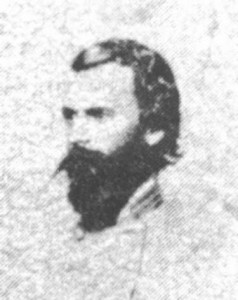 Many thanks to friend Clark B. Hall for sharing this poem with me.
Many thanks to friend Clark B. Hall for sharing this poem with me.
Capt. William W. Blackford was J.E.B. Stuart’s able engineering officer in the spring and summer of 1863. He was 31 and one of several brothers serving in the Confederate service. Blackford had a bird’s eye view of much of the day’s action, and he wrote this interesting poem about the June 9, 1863.
In case you were wondering why we fought so hard to save Fleetwood Hill, this poem ought to answer those questions.
Scridb filterTwice a thousand men in blue
And twice a thousand gray
Are pricking fast the space between
And ne’er a finer sight was seen
And ne’er a bolder band I ween
Then rode in that arrayAround the good old Mansion house
In flowery paths they meet
And bloody brushed the roses bloom
Neath foaming charger’s feet.Terrific was the shock, the shiver
The lines of battle rocked
Worse to horse and hand to hand
Swaying back and forth they stand
In deadly conflict locked.Tarnished is the sabre’s gleam
By many a bloody stroke
And dimly fades the fray from view
In dust and cannon smoke.Steeds with empty saddles strain
Around the field in fright
Pause and snort toss back their mane
And with look bewildered neigh again
For comrades left in the fight.O’er their battery sweep the waves
Of hottest action and
Triumphant now we wrest the prize
The proudest in a soldier’s eyes
Of captured cannon wonBeaten backward, stubborn still
Back from bloody Fleetwood Hill
Oft sound their bugles in retreat
For counter charges fierce to meet
Defiant still the bugles blew
With lines unbroken they withdrew.
Comments
Comments are closed.







 Back to top
Back to top Blogs I like
Blogs I like 
Thanks, Eric, for posting the poetic reminiscences of Capt. William Blackford–who, by the way, fought upon Fleetwood on June 9; so, Jeb Stuart’s valuable engineer knew only too well of what he so poignantly penned, here. The extraction you kindly published is but a few verses of a much larger poem Blackford wrote of the Battle of Brandy Station, and I’ll soon send that on to you, as well.
Don’t you admire how Captain Blackford focused a component of his verse on the reaction of horses to the fierce combat? The good captain certainly must have been thinking of his own warhorse, “Comet,”a gallant steed that carried Blackford through many a fight, and was often wounded.
As you know, much will soon be happening at Fleetwood–all good!–on the heels of the marvelous preservation triumph scored by the Civil War Trust when successfully purchasing the southern terminus of Fleetwood Hill; so, your readers should pay close attention to your blog in the weeks and months ahead.
Soon, we will all charge to ultimate victory at Fleetwood Hill!